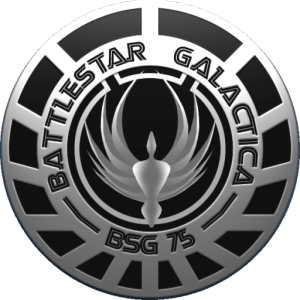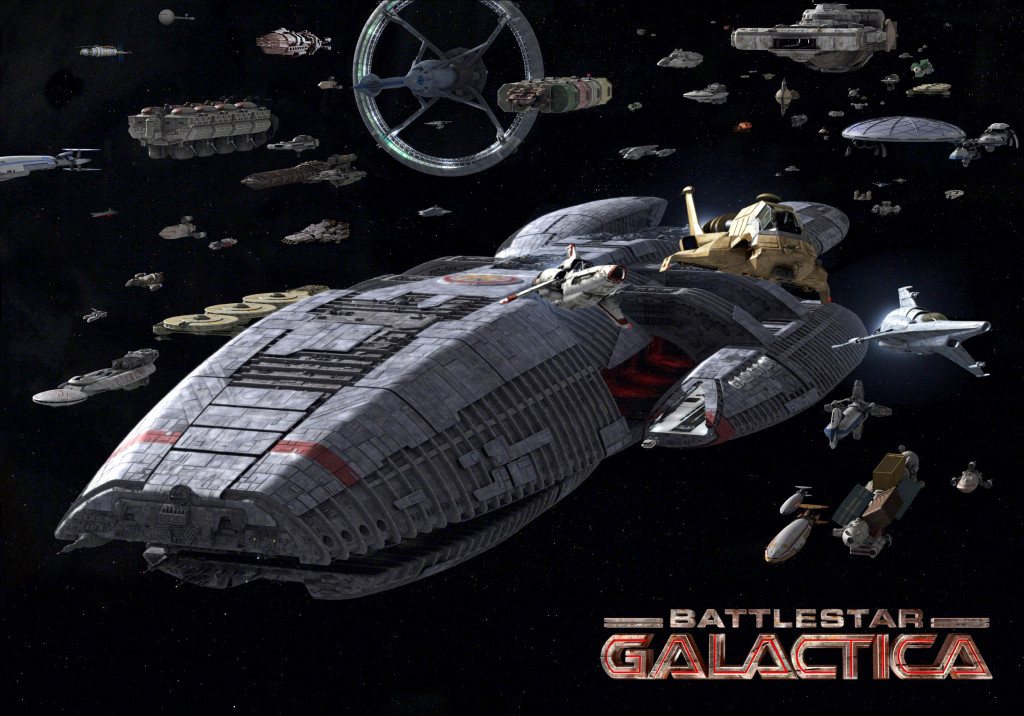 One of the ways I try to ameliorate the boredom of my five hours of daily commuting is to distract myself with entertaining TV shows.
One of the ways I try to ameliorate the boredom of my five hours of daily commuting is to distract myself with entertaining TV shows.
I have always been a fan of Science Fiction, and still remember watching early Doctor Who episodes from behind the sofa in my youth, and revelling in the cult trash of Blake’s Seven in my teens.
So I was aware of Battlestar Gallactica, but was confused by very mixed reviews of the series. It turns out there were two separate versions of the series, with a rather weak original from 1978, followed by a far superior ‘reboot’ from 2004.
The premise of the series is a familiar one from the annals of Sci-Fi. Robots developed to serve humankind develop consciousness, rebel and go to war against their masters. The Battlestar Gallactica version of this story takes place far into the future, after we have left earth and colonised distant space.
It follows on from 40 years of peace after a bloody war against the Cylons. Needless to say the Cylons (dismissed as ‘toasters’) have not been idle. They have spent the time infiltrating the human defences, using replicants (referred to as ‘skin jobs’). When their offensive finally starts the consequences for the human population are devastating, with billions wiped out in a nuclear apocalypse across the 12 colonies.
A mere 50,000 manage to escape destruction in a rag-tag collections of space-ships under the protection of a rather long in the tooth battlestar (think rusting old aircraft carrier), under the leadership of retirement ready admiral Adama. Their desperate hope is to find a new home in the now mythical planet of earth, whilst avoiding any run-ins with the vastly superior fire-power of the Cylon fleet.
So far so straightforward, with the addition of lots of fighting to keep things from getting dull. However the writers manage to take the story to the next level by exploring the overlaps between human intelligence, and these newly created sentient beings. For instance the many of the humans have a belief in their ‘old gods’, but this is trumped by the Cylon’s much stronger faith in their one god. They firmly believe it is their destiny to discover and repopulate earth, instead of the humans.
In one episode the humans are shown to be capable of an ‘inhuman’ level of cruelty to a flesh and blood Cylon. An ongoing theme concerns the humans who fall in love with ‘skin-jobs’ and vice-versa. Each being perceived to have betrayed their community. One case even leads to the birth of a human-cylon hybrid child, over whom both sides contest ‘onwership’.
As you can see, the four series of the show has kept me entertained with rapt attention over the past few weeks. But that is not the theme of this blog post…
For many years I have been aware of – and irritated by – the way American television programs are so prudish. Having been used to hearing swearing on British television since a teenager, it always seemed odd to have hard-hitting US programs limit themselves to the occasional mild obscenity. The notable exception to this rule is the HBO subscription channel, who have produced such wonderful series such as Six Feet Under, Curb Your Enthusiasm and Game of Thrones.
So, I was shocked to hear the F word uttered in the very first episode of Battlestar Gallactica. How were the makers of the show allowed to do this on American network channels?
But when I started listening more closely I realised the F word being used wasn’t ‘fuck’, but ‘frak’. Thanks to the hard work of some dedicated viewers it is possible to hear every frack voiced during the show on YouTube.
As you can hear, the word is used in all of its rich and varied contexts and meanings. Needless to say Wikipedia has a whole page on the use of frak and fraking in the series, and difference between the ‘frack’ used in the earlier version of the show.
At first this substitution seemed ridiculous. But after a while it began to seem natural and didn’t interfere with my enjoyment of the series. In fact it enhanced the ‘believability’ of the show. After all, people do swear a lot in life and death situations, and the military are famous for their sweariness.
So if you do get the chance to watch this epic series, which according to a friend was a “life-changing” experience, listen out for lots of fraking and try not be offended.



